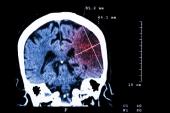Early Cognitive Dysfunction After AF Ablation Doesn’t Last
There is a recovery period, but evidence indicates ablation has positive effects on long-term brain health, Jonathan Piccini says.

Although there is a short-term risk of postoperative cognitive dysfunction after catheter ablation for atrial fibrillation (AF), it seems to resolve by 1 year, according to the results of a small randomized trial.
Patients who underwent ablation were more likely to have new-onset cognitive dysfunction at 3 months compared with those who remained on medical therapy alone (14% vs 2%; P = 0.03), but the difference was no longer significant at 6 months (4% vs 2%; P = 0.60). And by 1 year, all patients in the ablation group had normalized or improved cognitive function.
That transient impact on cognitive function came in the context of significantly improved quality of life and a decrease in the use of antiarrhythmic drugs with ablation versus medical therapy alone, researchers led by Ahmed Al-Kaisey, MBChB (Royal Melbourne Hospital and the University of Melbourne, Australia), report in a study published in the July 2023 issue of JACC: Clinical Electrophysiology.
“We believe this data provides reassurance regarding the impact of catheter ablation on cognitive function,” they write.
“It is interesting to speculate that longer-term follow-up may demonstrate a further differentiation in cognitive function between the groups and ultimately result in a lower incidence of dementia in the ablation group,” they say, adding, however, that longer-term studies in larger cohorts are needed to address that possibility.
Commenting for TCTMD, Jonathan Piccini, MD (Duke University, Durham, NC), said this trial highlights what previous studies have shown. “When a patient undergoes a fairly significant cardiovascular procedure . . . it’s not surprising that there would be some postoperative cognitive dysfunction,” he said. “There is some short-term risk that appears to be pretty small and largely resolves over time. And you have to put that in context with the benefits.”
Piccini pointed to the improvement in symptom severity and the reduction in AF burden after ablation seen in the current report. “The ultimate question would be if this study was larger and had longer follow-up, would you see cognitive improvement in the ablation arm say at 2 years, 5 years, 10 years? And I think that’s what the observational data suggest, but we don’t have long-term randomized data.”
A Short-term Risk
Though other studies have shown that there’s an early risk of postoperative cognitive dysfunction following AF ablation, likely due to the effects of anesthesia or new cerebral embolic lesions, whether the impact persists over the longer term has not been well studied.
In this trial, conducted at two tertiary hospitals in Australia, investigators randomized 100 patients with symptomatic AF who failed at least one antiarrhythmic drug (AAD) to continued medical therapy (AADs or rate-control medications) or catheter ablation performed under general anesthesia. With four patients lost to follow-up, 96 patients (mean age 59 years; 32% women) completed the study; 46% had persistent AF.
I think we would all agree that the main goal here is to keep our brains healthy in the long term. Jonathan Piccini
Cognitive function was assessed using six tests of memory, verbal fluency, and executive function. In the ablation arm, seven patients had new cognitive dysfunction at 3 months, two of whom continued to have deficits at 6 months. By 1 year, however, six of the seven patients had cognitive scores that had returned to baseline, with improved cognition seen in the seventh.
In the medical therapy arm, one patient—the same one, a 68-year-old man, at each time point—had cognitive dysfunction measured throughout follow-up.
The only independent predictor of postoperative cognitive dysfunction was a longer ablation procedure time, which averaged 49 minutes in those with deficits and 33 minutes in those with normal cognitive scores (P = 0.003). There were no differences in arrhythmia recurrence or AF burden after ablation between those with and those without postoperative cognitive issues.
Ablation was associated with several positive findings, including a greater likelihood of improved cognition (14% vs 0; P = 0.007) and lower use of AADs (32% vs 89%; P < 0.001) by 1 year compared with medical therapy alone. There were also reductions in documented AF during rhythm monitoring and AF burden in the ablation arm, as well as a better score on the University of Toronto AF symptom severity (AFSS) scale, which was first observed at 3 months and persisted through 1 year (mean 8 vs 14; P < 0.001).
Positive Effects on Long-term Brain Health
Piccini considered the results in the larger context of heart rhythm health overall. Events like stroke and hospitalization for heart failure have been the major focus of past research, and although those are critically important, Piccini said, “the more we understand about atrial fibrillation, the more we’re understanding a lot of it may be these slow, dramatically-lower-impact influences that accumulate slowly over time,” like cognitive dysfunction.
Overall, he said, the trial doesn’t dissuade him about the positive risk-benefit balance of AF ablation and instead highlights the need to counsel patients about the recovery period after the procedure. There may be “brain fog” or some other cognitive difficulties for a short period of time, “but those things will likely regress, and the reality is that in longer-term data it appears that ablation and rhythm control are associated with improved brain health,” Piccini said. “And I think we would all agree that the main goal here is to keep our brains healthy in the long term.”
In an accompanying editorial, Sanghamitra Mohanty, MD (Texas Cardiac Arrhythmia Institute, Austin), and colleagues point out some limitations of the trial, including the small number of cases of cognitive dysfunction and the questionable sensitivity of the surveys when detecting mild cognitive decline.
Also, “the authors focused on a negative finding that was very transient and detected in a small number of patients, instead of highlighting some important positive findings in the ablation group,” they say. “Thus, despite our sincere congratulations to the authors, it is prudent to conclude that the study conducted by Al-Kaisey et al demonstrated an overall positive impact of catheter ablation on cognition in AF patients and the transient cognitive decline seen in a small number of cases was, very likely, a physiological reaction to the stress and strain of the procedure in patients with cognitive frailty.”
Todd Neale is the Associate News Editor for TCTMD and a Senior Medical Journalist. He got his start in journalism at …
Read Full BioSources
Al-Kaisey AM, Parameswaran R, Bryant C, et al. Impact of catheter ablation on cognitive function in atrial fibrillation: a randomized control trial. J Am Coll Cardiol EP. 2023;9(7):1024-1034.
Mohanty S, Natale A, Di Biase L. Impact of catheter ablation on cognition in atrial fibrillation: is the glass half-empty or half-full? J Am Coll Cardiol EP. 2023;9(7):1035-1037.
Disclosures
- Al-Kaisey reports support from a National Health and Medical Research Council research scholarship.
- Mohanty reports no relevant conflicts of interest.




Comments